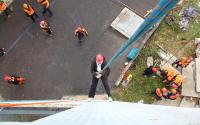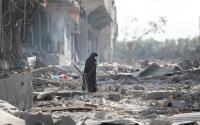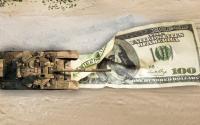3 May 2006The Guardian
Till now, what has prevented the crisis in Iraq from becoming a total debacle for the United States has been the open collaboration of the Iranian clerics. Iranian foreign policy - fragmentary and opportunist - has always been determined by the needs and interests of the clerical state rather than any principled anti-imperialist strategy. In the past, this has led to a de facto collaboration with Washington in Afghanistan and Iraq. During the Iran-Iraq war, the clerics had no hesitation in buying arms from the Israeli regime to fight Iraq, then backed by Britain and the US. In the wake of the Anglo-American invasion of Iraq - hoping, no doubt, that clearing the path for the overthrow of Saddam Hussein and Mullah Omar might have won them a respite - the regime took a tougher stance on the nuclear question.
The Bush administration appears to be psyching itself up for a safe strike against Iran either by itself or via the Israelis, whose new leaders have referred to the Iranian president as a psychopath and a new Hitler. Why has Washington manufactured this crisis? The hypocrisy of Bush, Blair, Chirac or Olmert - their own states armed with thousands of nuclear weapons - making a casus belli of what are, by all accounts, primitive gropings on Iran's part towards the technology necessary for the lowest grade of nuclear self-defence, hardly needs to be spelled out. So long as these powers are allowed to enlarge their nuclear armouries unimpeded, why should Tehran not?
The country is not only ringed by atomic states (India, Pakistan, China, Russia, Israel), it also faces a string of American bases with potential or actual nuclear stockpiles in Qatar, Iraq, Turkey, Uzbekistan and Afghanistan. Nuclear-armed US aircraft carriers and submarines patrol the waters off its southern coast. Historically, Iran has every reason to fear outside threats. Its elected government was overthrown with covert Anglo-American aid in 1953, and the secular opposition destroyed. From 1980 to 1988, the western powers abetted Saddam Hussein's onslaught, in which hundreds of thousands of Iranians died. More than 300 Iraqi missiles were launched at Iranian cities and economic targets, especially the oil industry. In the war's final stages, the US destroyed nearly half the Iranian navy in the Gulf and, for good measure, shot down a crowded civilian passenger plane.
For the clerical state, the war on terror has been the best and the worst of times. Oil prices have soared. Enemy regimes on both sides, Baghdad and Kabul, have been overthrown. The Iraqi Shia parties that they have been fostering for years are now in office. Washington has been reliant on their help to sustain its occupations both there and in Afghanistan. Yet social tensions in Iran are high. In this context, the nuclear issue is one of the regime's few unifying projects. It is worth recalling that the Iranian nuclear programme began under the Shah with technology offered by the Americans. Khomeini put the project on hold, considering it un-Islamic. Operations were restarted, with Russians later taking over construction of the light-water reactors at Bushehr begun by the West Germans in the 1970s. From the start, Iran, like Germany, the Netherlands or Japan, has wanted its programme to take in the full nuclear cycle, including uranium enrichment; Russia has several times threatened to impose conditions on fuel deliveries. Enrichment centrifuges were surreptitiously imported from neighbouring Pakistan; not the process, but the failure to report it, was in contravention of International Atomic Energy Agency (IAEA) agreements.
There is no evidence that Iran is much closer to nuclear weapons now than was Iraq in September 2002, when Blair and Cheney assured the world that Baghdad represented a "genuine nuclear threat". Reports in 2003 by a somewhat demented sect, the Mojahedin e-Khalq, of preliminary nuclear research at the Natanz installation were no such proof. But in the competitive scramble by European powers to enhance their standing with Washington after the invasion of Iraq, France, Germany and Britain were keen to prove their mettle by forcing extra agreements on Tehran. The Khatami regime immediately capitulated. In December 2003, they signed the "Additional Protocol" demanded by the EU3, agreeing to a "voluntary suspension" of the right to enrichment guaranteed under the Non-Proliferation Treaty (NPT).
Within three months, the IAEA was condemning them for having failed to ratify it; in June 2004, its inspectors produced examples of Iranian enrichment work, perfectly legal under the NPT, but ruled out by the Additional Protocol. Israel has boasted of its intention to "destroy Natanz" - the contrast to its stealth bombing of Iraq's Osirak reactor in 1981 a measure of the new balance of forces. In the summer of 2004, a large bi-partisan majority in the US Congress passed a resolution for "all appropriate measures" to prevent an Iranian weapons programme and there was speculation about an "October surprise" before the 2004 presidential poll. Plans were thus well advanced before Mahmoud Ahmadinejad's victory in the June 2005 Iranian presidential election.
Ahmadinejad reaped the vote against Khatami's miserable record between 1997 and 2005. Economic conditions had worsened and Khatami was prepared to defend the rights of foreign investors, but not those of independent newspapers or protesting students. Manoeuvring ineffectually between contradictory pressures, he exhausted his moral credit. Contrary to some reports, Ahmadinejad has not so far imposed any new puritanical clampdown on social mores. Instead, the most likely constituency to be disappointed is Ahmadinejad's own: the millions of young, working-class jobless, crammed into overcrowded living conditions, in desperate need of a national development policy that neither neoliberalism nor Islamist voluntarism will provide.
Nor is fundamentalist backwardness exhibited in the denial of the Nazi genocide against the Jews and the threat to obliterate Israel, a basis for any foreign policy. To face up to the enemies ranged against Iran requires an intelligent and far-sighted strategy - not the current rag-bag of opportunism and manoeuvre, determined by the immediate interests of the clerics.
Clearing the way for the overthrow of the Iraqi Ba'ath and Afghan Taliban regimes and backing the US occupations has bought no respite. The US undersecretary of state has spoken of "ratcheting up the pressure". Israeli defence minister Shaul Mofaz has said that "Israel will not be able to accept an Iranian nuclear capability, and it must have the capability to defend itself with all that this implies, and we are preparing." Hillary Clinton accused the Bush administration of "downplaying the Iranian threat" and called for pressure on Russia and China to impose sanctions on Tehran. Chirac has spoken of using French nuclear weapons against such a "rogue state". Perhaps it is simply high-octane rocket-rattling, the aim being to frighten Tehran into submission. Bullying is unlikely to succeed. Will the west then embark on a new war? If so, the battlefield might stretch from the Tigris to the Oxus and without any guarantee of success.
· Tariq Ali is the author of Clash of Fundamentalisms: Crusades, Jihads and Modernity
#comments { font-size:70%; font-family:Geneva, Arial, Helvetica, sans-serif; } #comments div.commentheader p { font-size:1.2em; } #comments { clear:both; margin-top:25px; width:256px; } #comments h3 { color: #fff; padding:2px; margin-bottom: 10px; font-size:1.3em; background-color:#999; } .individualcomment { font-size:1.2em; clear:both; margin-top:10px; padding-top:10px; border-top:1px solid #999; } .dateline { font-weight: normal; color:#999; padding-top:2px; margin:0 0 15px 0; } .byline { font-weight:bold; padding:0; margin:0; }





